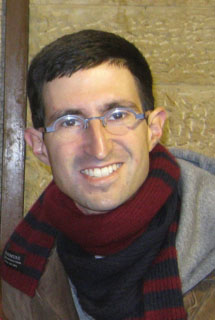Name: Eran Mukamel
Hometown: Born in Rehovot, Israel / grew up in Rochester, NY.
Hobbies: I love music, and I play the clarinet. I also like to read, hike and jog.
What do you study? I study how our brains allow us to see, feel, think, walk, run, and sleep. All of these are (to a scientist!) amazing talents that no machine can accomplish, at least not yet. I’m a neuroscientist, which means I believe that we can learn about how we do these things every day by studying how brain cells work together in groups called networks. Brain networks are amazingly complex, but by using special microscopes, computers, and other tools, we can learn about how the many parts of the brain make us who we are.
Why is it important? There are many reasons to study the brain. For me, the most important is that the brain is the greatest “unknown” in the universe. We know a lot about the laws that rule the planets and shape the universe, but when it comes to the 3 pounds of gooey tissue between our ears (the brain!) we have no really solid theories to explain what it does. This is also important because brains, like any complex machine, sometimes malfunction, and many people suffer from illnesses like Alzheimer’s disease or attention deficit disorder. Knowing how brains work will help find ways of improving brain function, or even curing some of these illnesses, and it could help the rest of us as we try to use our brains to learn, remember, think and feel.
What do you like about being a scientist? I love that science has no boundaries. There are no questions that we are “not allowed” to ask. This means that scientists are a lot like kids; we are constantly asking how things work, why they work that way, and how we could make them work differently. Science is also great because it involves a lot of teamwork, which is important since no one scientist has the knowledge or skills to solve the hard problems on their own.
Here is a movie my coworkers took of brain activity in a mouse. On the left you can see the mouse running around its cage, and on the right you can see individual brain cells lighting up.

